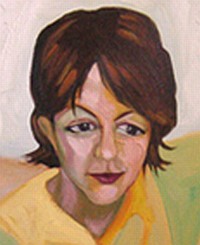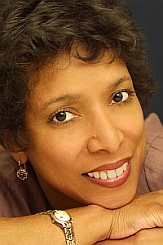INTERVIEW
An Interview with Candace Pearson
~ Lynne Thompson

Candace Pearson is the author of Hour of Unfolding, which won the 2010 Liam Rector First
Book Prize for Poetry from Briery Creek Press at Longwood University. She is a Pushcart Prize nominee and has
had poems published in numerous fine journals nationwide, including Ploughshares, Crab Orchard Review, Comstock
Review, 5AM, Poem/Memoir/Story and MARGIE. Her work appears in several anthologies, most recently
Beyond Forgetting: Poetry and Prose About Alzheimer's Disease and Sharing the Seasons: A Book of Poems.
|

Lynne Thompson won the Perugia Press Book Prize for her first full-length collection of poems, Beg No Pardon
which was also awarded the Great Lakes Colleges Association New Writers Award. A four-time Pushcart Prize nominee
and a frequent reader at venues across the country, Thompson also authored two poetry chapbooks: We Arrive By Accumulation and Through A Window.
Her work has recently appeared in numerous journals and anthologies including Sou'Wester, Spillway, Ploughshares
and New Poets of the American West. Thompson is the Director of Employee & Labor Relations at the University of California, Los Angeles.
|
Lynne Thompson: Before getting to the specifics of the development of Hour of Unfolding, can you talk about your writing process from first scribble through the jungle of revision - what are some of the concepts you're thinking about?
Candace Pearson: A poem may begin with the sound of two or three words bumping against each other. Or it may start with a quirky, odd bit of story. Or a place, some ephemeral something that a place evokes, landscape as metaphor. Sometimes I write a few phrases to make sure they're not lost; sometimes I write all I can, as fast as I can. I'm not sure I'm thinking of concepts at that point, just exploring, trying to figure out why something has intrigued me.
LT: What was your process in sending out the manuscript that became HOU for publication? Did you limit yourself to contests or were there other agonies that you considered? What kind of responses were you getting to your submissions? Over what period of time did you submit before winning the Liam Rector Book Prize in 2010?
CP: I purposefully limited myself to contests, mostly first book contests, a few first-second and all-book contests. I wanted to test my work against a national scene. My first mailing resulted in a finalist slot, which spoiled me. I got a handful of semis along the way, too. In all, the process from first mailing to last took a year.
LT: Hour of Unfolding is a wonderful title and metaphor for the poems in this collection. Was it your first choice and if not, can you talk about your intentions in finally selecting it?
CP: My initial title was "Controlled Burn," but I soon learned that title was shared by a literary journal. So the title became "Paper Wasp Nest," from the final poem, which evokes the journey toward a chosen family. After the ms. was chosen for the Liam Rector Prize, the publisher spotted a book of poems in a store entitled "Paper Wasp." I scoured my ms. for new titles and suggested "Hour of Unfolding" - we both liked it. For me, it represents the book's layered time and sense of possibility - the feeling that a door could open somewhere and, at any moment, any hour, your life could change.
LT: I'm interested in the movement from family to landscape in these poems-was this a deliberate movement on your part and at what point in the process did you realize this was the direction the manuscript was taking?
CP: For me, landscape is threaded through the book from the first poem, "Panorama Drive," on. Landscape isn't pretty postcards or snapshots-it's a character all its own. It can be foreboding, intimate or grand, comforting, heart-breaking. And it's all metaphor all the time (pretty much). The narrator in the book wants to leave the land but the land won't leave her. It's inside her.
LT: How did you-do you-envision your role as a poet navigating the terrain of family & geography?
CP: That's just natural territory for me. I don't envision a role, I just dive into that terrain. If I had to characterize it, I might say I'm seeking new ways (at least for me) to mine family and geography, to deconstruct and reconstruct.
LT: In my reading of HOU, the sense of displacement is evoked by its opposite - the return to a specific place. Is this an accurate way, from your perspective, for the reader to understand the collection?
CP: Nicely put. Jan Beatty said it well, too. She was the judge chose my ms. as the winner of the 2010 Liam Rector First Book Prize for Poetry from Longwood University. In her comments, she said, "This is a book about time in all its thickness
. . . is there a name for the place between staying and leaving?" The narrator of HOU feels foreign to the landscape in which she lives, but she's drawn to it, too.
. . . is there a name for the place between staying and leaving?" The narrator of HOU feels foreign to the landscape in which she lives, but she's drawn to it, too.
LT: Can you talk about the conspiratorial tone that exists in some of these poems? I'm thinking in particular of "Closing Time" and "Tango, the Poem."
CP: I envision that I'm talking personally to someone. In these kinds of poems, I want to create an atmosphere that envelops the reader/listener in that place and doesn't let them out till the end. Well, even better is when they don't want out.
LT: What is the role of anger, if any, in the poems of HOU?
CP: I don't see anger as playing any major role. Hmm, let me try again. In some poems, like "My Brother is Busy," the narrator is fed up, So is that anger? Likely. In "Floyd Patterson," she doesn't want to be her father's cutman anymore. There's some anger there, but mixed with sadness, resignation, love. I think of the poems as occurring, to varying degrees, at some point past anger.
LT: Talk about the impact of light and darkness in your poems? I'm thinking about "Alfalfa Light," "Weedpatch Highway" and "Trolling," for example.
CP: And "Closing Time," which takes place in the wee hours, while "In Spanish Town" is twilight. This is making me wish I'd written more poems with light & dark as important players. One exposes, one comforts; one reveals, one obscures. It's all part of the immersion.
LT: Was there a sense of risk you felt you had to overcome in these poems and, if so, how did you do it?
CP: The risk is trying to tell something tough with a sense of detachment. To temper passion with dispassion. Be willing to take a straight-on gaze, don't look away. Another risk is being thought of as "confessional." It's such a taboo word now in poetry. But not one I apply to my work. Odd, perhaps, but I don't think of this as "my" story. It's a story shared by many, the story of exile, of surviving family.
LT: One of my favorite poems in the collection is "Dating Octavio Paz." Can you talk about the genesis and development of that poem as well as your personal relationship (if you're willing to tell secrets!!!) with Octavio Paz?
CP: I am not the woman who dated Octavio Paz, no matter what the tabloids say. Or those Polaroids from that gas station in Barcelona. Thank you for liking that poem. Years ago, I met a woman in a writing workshop who was working on a novel that took place on a cruise ship. She had a kind of older-mousy-secretary look, as if she'd stepped out of a Doris Day movie where she'd been playing second banana. At least that's what I had decided.
One day she said to me, "I dated Octavio Paz." It kept with me, and I finally put it in a poem about how we all yearn for more-or should. For me, the date with Octavio Paz is a date with poetry.
One day she said to me, "I dated Octavio Paz." It kept with me, and I finally put it in a poem about how we all yearn for more-or should. For me, the date with Octavio Paz is a date with poetry.
LT: I'm title-challenged in my own poems. Thinking of the chicken-and-egg theory, how did you come to titles for your poems?
CP: I consult the power of Ouija. I channel a 3,000-year-old spirit.
LT: How deliberate are you in determining rhythms given the subject matters of the manuscript?
CP: Fairly deliberate. It's something I work on the most - the music. I can happily play for a long, long time with rhythms and sounds. I think about pacing and about the alphabet as a scale of notes. But you have to be careful as you're writing not to be seduced by the music alone; you have to be willing to give up your favorite rhythms and sounds if they're not working for the whole.
LT: What tropes do you feel you haven't exhausted and would like to revisit in your next collection of poems?
CP: I'd like to have one-tenth of Sylvia Plath's facility with metaphor.
LT: Would you consider yourself a lyric poet? A narrative poet? Or do you go in fear of characterizations and, if so, why? In any event, did lyricism and/or narrative play a role in the poems of HOU?
CP: I generally don't believe such characterizations. If I had to, I'd call what I do lyric narrative. I'm not doing "A happened, then B, then C." It's selective and often non-linear or jump-cut even in the most story-like poems. There seems to be a narrative working horizontally, then you go into the lyric, like a vertical mine shaft. Or maybe the direction is up, a leap into free air.
I keep trying to wrap and unwrap story, to tell the essence. It's emotional truth that matters, not chronological.
I keep trying to wrap and unwrap story, to tell the essence. It's emotional truth that matters, not chronological.
LT: In developing this manuscript, were there any poets who influenced your writing decisions and, if so, would you care to say who those were?
CP: Not so much influenced development of the manuscript in a conscious way. But in terms of influencing my writing in general, I'd said Larry Levis and Marie Howe. Levis for his sheer brilliance with a charged landscape and lyrical observation; Howe for her emotional bravery, her powerful storytelling and way with a line.
LT: How do you go about selecting an arc among these poems when you give readings from HOU?
CP: I try to take the listener on a journey through the book and its major themes. Different venues call for different tones. Sometimes a reading set will be more playful; other times I go for the edge. I balance the hard family stuff with some humor when I can or take people into just so much difficult subject matter, then let them off the hook with some anti-love poems. The poems need to knock against and echo each other. There's an undulation going on.
